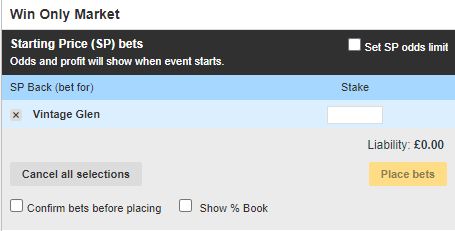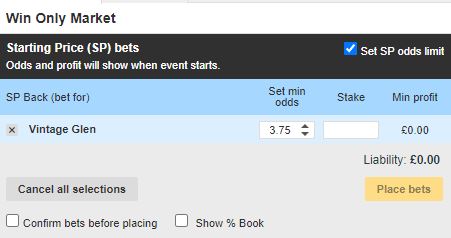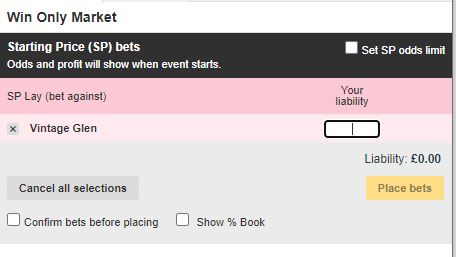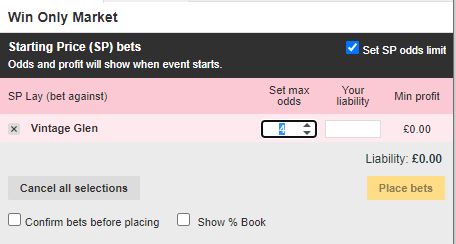What is a Betting Exchange?
A betting exchange allows members to bet against each other rather than a bookmaker. Customers can offer odds to, or request odds from, fellow bettors.
Where traditional bookmakers risk going head-to-head with gamblers on markets, a betting exchange takes on no risk at all. Instead, a betting exchange provides the platform for its customers to match bets against each other and takes a small commission on winnings.
How does a Betting Exchange work?
The big difference with exchanges compared to bookmakers is they allow lay betting. This means backing a selection to lose rather than win.
Every bet placed on a betting exchange involves two bets really – one bet backing the selection to win, and a second bet backing the same selection to lose.
Say I want to place a £10 bet on a horse to win at 10/1 which returns a profit of £100, I need someone else to risk £100 at 1/10 to win £10.
This option to lay a bet makes it much easier for customers to guarantee a return if the odds shorten after they’ve placed their bet.
Where backing a horse with a bookmaker would require you to back every other horse in a race to “green up”, on a betting exchange you can back your selection to lose after the price has shortened to lock in a profit.
Why use a Betting Exchange?
There are many benefits to using an exchange instead of a bookmaker.
A betting exchange provides greater choice for punters. Before, if a bookie wasn’t willing to risk the odds or the stake you wanted, you simply couldn’t have your bet. With an exchange, you only need to find another member willing to take on the risk and lay your bet. Betting exchanges allow users to find odds and markets they want.
Second, value for bettors will generally be better on an exchange. Bookmakers, in order to make a profit, do not offer the “true” odds on a selection, but rather take a fraction off the odds of an event happening in order to make money.
On an exchange, the market isn’t priced up by one person. The market is made up of hundreds or thousands of bets placed by others. That means there is more pressure on layers to offer fairer prices. If not, they risk their bets not being matched.
Exchanges also allow greater flexibility for bettors to trade their positions on markets than traditional bookmakers.
Like the stock market, the value of a bet can go up or down. Imagine the team you’ve backjed is winning but they’ve just had a player sent off. Are you still as confident in them now as at kick off?
On an exchange, you can lay them to get your stake back and possibly some profit.
Which is the Best Betting Exchange?
This mainly depends on what markets you intend trading in and how much you want to stake. For most traders, Betfair is the exchange to use (if not the exchange of choice). It is the largest, most established and has the widest range of markets available with the highest levels of liquidity.
For any serious trader, a Betfair account is a must. However, Betfair has a habit of crashing from time to time, particularly on really busy Saturday afternoons!!! There are few things more annoying than being left with open positions across several markets you can’t trade out. I’d suggest you get yourself at least one backup account on either Betdaq, Smarkets or Matchbook
For years now we’ve been waiting for one of the other Exchanges to put up a real challenge to Betfair. Unfortunately they continue to stay in Betfair’s wake… This means Betfair has been able to use its Premium Charge (details below) to tax its more successful accounts. In turn they extract far more charges than would be paid based on the usual commission rates.
Greater competition to Betfair would potentially mean them having to reconsider their approach to the Premium Charge.
Range of Markets and Liquidity
Betfair has the widest range of markets available. That doesn’t mean you’re guaranteed to get decent bets placed across all of them. What that means to Traders is if you want to trade on less mainstream markets decent stakes won’t be available. As importantly, the prices available won’t be as ‘efficient’ as they would be on the bigger events.
What do you mean ‘efficient’?
Take a look at the prices from Betfair shown below for a game due to start shortly in Portugal. For the Match Odds market, the best Back price on the home team is 1.91 with just £7 available and the best Lay price is 2.06 for £4. So, there’s a large gap of 0.15 between the back and lay prices and little money available in the market.
The £295 Matched figure means few Betfair users are interested in the market. Traders will normally be looking for a minimum of £10K to be matched pre-match. This will depend on the market and how you intend to trade.
This isn’t a market that you want to get involved in from a trading perspective. The prices available to back the home, away or draw result are probably not much better (if at all) than you could back with a bookie.
Equally, you can see the prices available for some other markets for this match have quite a spread between the best Back & Lay prices with low stakes available and in some cases no bets matched so far.

Compare the match in Portugal with the Southampton vs Aston Villa match which starts a little later.
Over £300K has already been matched. The Back and Lay prices are all within 1 ‘tick’ of each other. This means they are sequential with no price gaps between them. Betfair doesn’t have a price of 2.07 for example, and for prices between 2.0 and 3.0 the available prices increase by 0.02. The current best Lay price on Aston Villa of 3.9 only has £2 available. All other prices have upwards of £1,900 currently available so liquidity is not going to be an issue. This is ideal for most forms of trading.

I thought it would be useful to do a comparison of this match across the other 3 exchanges. I shown below their equivalent prices. There are some minor differences in prices which is quite usual. You can see that the total stakes available (liquidity) is still quite high with Betdaq having the lowest.
If you intended to trade this match you could potentially use any of the 4 exchanges. BUT if you plan on trading when the match starts and goes in-play, you will most likely see considerably more liquidity and ‘tighter’ prices on Betfair than the others. Betfair would therefore be better for trading.
BETDAQ

MATCHBOOK

SMARKETS

Commission rates
Until fairly recently, a range of standard commission rates were being applied by the various exchanges. Betfair had the highest rate at 5% (with some exceptions). However, they all now have a commission rate of 2% available to users.
That can vary though with 0% offers available from time to time. For example Betdaq is currently operating with 0% on everything except Football, Horse Racing, Greyhounds and Cricket.
Similarly, Matchbook has 0% commission on Cricket which has been running during the 2021 T20 World Cup and through to the end of the Ashes in 2022. The lower commission offers will most likely be from Betdaq, Smarkets and Matchbook. They do so to try and increase their market share and eat into Betfair’s market domination.
An important point regarding the Betfair commission rate is that you have the option to choose which ‘Plan’ you want to apply to your account. There are 3 plans:-
BASIC has 2% commission but no access to Promotions or Best Odds Guaranteed on their Sportsbook
REWARDS has a 5% commission rate, a monthly £5 Exchange Free Bet and access to Promotions etc
REWARDS+ has an 8% commission rate, 10% Refund on Losses each month, a monthly £5 Exchange Free Bet and access to Promotions etc.
When you sign up with Betfair I assume they default your account to the REWARDS plan. If you want to benefit from 2% commission you’ll need to go into ‘My Account’, ‘My Betfair Account’. Then choose your Plan under ‘My Betfair Rewards’.
‘Starting Price’ Options
One frustration with betting on Exchanges can be when you want to place a bet ahead of an event starting. The market for back and lay prices probably won’t be well formed. I’ve shown below the Betfair market for a race at Doncaster tomorrow. You’ll see that the Betfair market is just forming.

Let’s say I want to Back Vintage Glen before I go out tonight for a few drinks. I then need to leave early in the morning to take my wife shopping for the day. I won’t be able to monitor the price for Vintage Glen before the race starts. So I have to decide now whether to place a bet.
I’m not going to take the £2 available at 1.11. Although there are no prices available yet with any bookies, I have seen a much higher forecast price on the Sporting Life website of 3.75 (or 11/4).
I could place a Back bet on Betfair for 4.0. The bet is unlikely to be matched yet but might before the start of the race. Then I could set that Back bet to ‘Keep’. If the bet is unmatched before the start, it might get matched in-play. I’m not keen as it might only get matched in-play if Vintage Glen isn’t running well.
An easier option is to place a Back Bet at 4.0 or higher and set it to ‘Take SP’ if unmatched before the off. I can then guarantee a matched Back Bet.
Even simpler, in the graphic above there are ‘SP’ buttons on the Back (Blue) and Lay (Pink) sides. I click the Back SP button and enter my Stake. If I want I can also tick ‘Set SP odds limit’ and set a minimum price for my Starting Price bet. For example, only bet at the Betfair Starting Price if it is at least 3.75.


Ok, that was a long-winded way of me pointing out that Betfair makes Starting Prices (BSP) available on most horse races. They usually have BSP on UK, Irish and Australian Win and Place markets and most other overseas Win markets.
You can also place Lay Bets at the BSP on the same principle, but the key difference is that your ‘stake’ is the amount you are willing to risk as your loss i.e., your Liability. Users can also set a maximum price they are willing to lay at. Their bet won’t be matched if the BSP is higher.


The other Exchange to offer their own Starting Prices is Betdaq. They call it XSP and it is available on UK and Irish Win markets only. They also offer XSP on selected Football Match Markets.
This is usually the major European Leagues – English Premier, Spanish la Liga, German Bundesliga, Italian Serie A, French Ligue 1. XSP may also be available for match markets in other sports like American Football and Cricket.
The way you place a bet at XSP on Betdaq is a little clunkier than Betfair. You place a normal bet but then select ‘Take XSP’. For example you want to place a Back Bet at XSP when the market is still in its early stages. You would place a Back Bet for 1000.0 (or a suitably high price) and select ‘Take XSP’.
I’m pretty sure there are no BSP or XSP equivalents at either Smarkets or Matchbook.
Apps / Software / API access
Most exchange users will use Betfair, Betdaq, Smarkets or Matchbook via an app on their phone, tablet or via the web sites. That will give them all the functionality they need with easy access to events and markets via a user-friendly interface.
The web interfaces provided by the different exchanges will have their fans and haters with most users probably indifferent. However, if you want additional options such as ladder interfaces or the ability to trigger automated bets based on your own criteria then you’ll be looking at the various bespoke apps and trading software available for each exchange.
There are plenty of firms providing trading software for Betfair. Some firms have versions of their software designed for Betdaq or Smarkets. Typically, software with the most functionality will only support Betfair, particularly if you want your own automation or triggered betting. However, before investing in trading software you need to know how you intend using it. Why pay for the add-ons if you want a Ladder interface rather than the usual Back / Lay price format?
Betfair Premium Charge
Most Betfair users won’t be aware of the Betfair Premium Charge (PC). It is unlikely to impact them. As a successful trader on Betfair there may come a time when the Premium Charge bits. If so, there will be other charges which Betfair apply in addition to the commission taken from individual trading profits.
You should be aware of this. Make sure you fully understand how it might impact on your Betfair account and potentially your PROFIT!
In summary, the Premium Charge assessment applies when you have won over £1K and bet in over 250 markets. There is a weekly calculation of your Gross Profits and the ‘Total Charges’ (based on your wins and losses) generated over the lifetime of your account. If your Total Charges are less than 20% then you may be liable to pay a weekly Premium Charge. There is also a £1,000 lifetime allowance against the Premium Charge. There’s a £1,000 credit per user before actual Premium Charge deductions.
For extremely successful Betfair users, the Premium Charge percentage is higher than 20%, currently peaking at 60%.
Whether the Premium Charge (PC) is likely to affect you will depend on your profits and how you make them. The definition of ‘Total Charges’ is: –
The Commission you have paid plus Implied Commission based on your losses divided by 2.
Implied Commission is calculated as total losses across your losing markets x 3%.
How you make money on Betfair will affect how the Premium Charge might apply. Let’s look at 2 people making the same amount of profit on Betfair from the same number of bets/trades: –
Mark is a trader and makes his profit pretty consistently with a low level of losing trades. His ‘Total Charges’ will be similar to the actual charges he has paid. Mark will probably be affected by the Premium Charge.
Clare on the other hand doesn’t trade and is a bettor. None of that trading lark for her, it’s all about straight bets, adrenaline and winning or losing each one. She typically bets at reasonably high odds (8/1 or 9.0 and above).
While she makes same overall profit as Mark, she has a higher proportion of losing bets than winning ones. Her PC ‘Total Charges’ will be higher than Mark due to her ‘winning peaks’ and ‘losing troughs’. Mark’s profit was earnt more steadily. Clare may not pay any Premium Charges or if she does, they will be much lower than Mark’s.
You can see your own Betfair Premium Charge Lifetime summary, in the Betfair ‘My Account’ section. It’s under ‘Betting Activity’ with ‘Premium Charges’ the bottom menu item. The Betfair Premium Charge is updated weekly. There’s a Lifetime summary of Gross profit & loss, Charges paid (amounts and percentage) as well as Commission & charges from the last week.
Make sure you keep up to date with your account and where you stand with the Premium Charge.
Summary
As things stand, anyone who is serious about making profits from sports is going to have a Betfair account. That applies to traders, matched bettors or straight bettors. They have a wider range of markets and available prices than the other exchanges. Liquidity levels and trading software options are also greater than their competitors. They now also offer a 2% commission option to bring themselves in line with the others.
I’d certainly recommend having at least one backup exchange account. I have accounts with Betdaq, Smarkets and Matchbook but I use Betdaq more than the others. I’ve had a Betdaq account for a long time. I mainly use the Betdaq XSP option to place bets on English Premier League matches.









